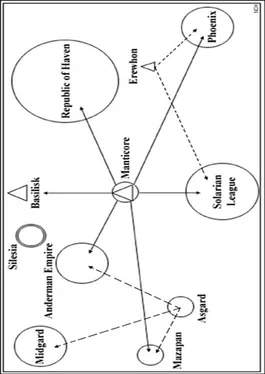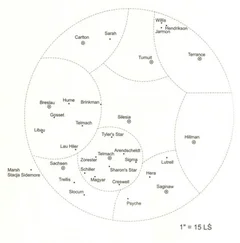David Weber - On Basilisk Station
Здесь есть возможность читать онлайн «David Weber - On Basilisk Station» весь текст электронной книги совершенно бесплатно (целиком полную версию без сокращений). В некоторых случаях можно слушать аудио, скачать через торрент в формате fb2 и присутствует краткое содержание. Жанр: romance_sf, на английском языке. Описание произведения, (предисловие) а так же отзывы посетителей доступны на портале библиотеки ЛибКат.
- Название:On Basilisk Station
- Автор:
- Жанр:
- Год:неизвестен
- ISBN:нет данных
- Рейтинг книги:5 / 5. Голосов: 1
-
Избранное:Добавить в избранное
- Отзывы:
-
Ваша оценка:
- 100
- 1
- 2
- 3
- 4
- 5
On Basilisk Station: краткое содержание, описание и аннотация
Предлагаем к чтению аннотацию, описание, краткое содержание или предисловие (зависит от того, что написал сам автор книги «On Basilisk Station»). Если вы не нашли необходимую информацию о книге — напишите в комментариях, мы постараемся отыскать её.
On Basilisk Station — читать онлайн бесплатно полную книгу (весь текст) целиком
Ниже представлен текст книги, разбитый по страницам. Система сохранения места последней прочитанной страницы, позволяет с удобством читать онлайн бесплатно книгу «On Basilisk Station», без необходимости каждый раз заново искать на чём Вы остановились. Поставьте закладку, и сможете в любой момент перейти на страницу, на которой закончили чтение.
Интервал:
Закладка:
The lift stopped at the bridge. It was Lieutenant Panowski's watch, and the acting astrogator rose from the command chair as his captain stepped onto the command deck.
"Carry on, Lieutenant," she said, and guided her guest toward the briefing room as Panowski sank back into his chair. No one else even looked up from his or her duties. It was a studied refusal to acknowledge Hauptman's presence, and she smothered a wry smile at her bridge crew's unspoken disapproval of the man as the briefing room hatch opened before them. Of course they all knew or suspected why Hauptman was here, and their silent support was even more precious after the listless depression and covert hostility those same people had once shown her.
The hatch closed, and she waved Hauptman to a chair. The business magnate crossed to it, but paused without sitting and glanced at McKeon.
"If you don't mind, Commander Harrington, I would really prefer to speak to you in private," he said.
"Commander McKeon is my executive officer, Sir," she replied with cool courtesy.
"I realize that, but I'd hoped to discuss certain . . . confidential matters with you. With all possible respect to Commander McKeon, I'm afraid I really must insist on discussing them privately."
"I regret that that won't be possible, Mr. Hauptman." Her face was serene, and no one else needed to know how hard it was for her to keep a brittle edge out of her voice. She drew out her own chair and sat in it, beckoning for McKeon to sit at her right hand, and smiled at Hauptman.
The first true expression crossed her visitor's face—a slight flush on the strong cheekbones and a subtle flaring of the nostrils—as she rejected his demand. Clearly, Klaus Hauptman was unused to having his will crossed. That was too bad, but he might as well get used to it now.
"I see." He smiled thinly and sat in his own chair, leaning back and crossing his legs with elegant ease as if to place the seal of his personal possession on the briefing room. Honor simply sat waiting, head slightly cocked, wearing an attentive smile. McKeon's face was less open. He wore the formal, masklike expression she'd come to know and hate, but this time it wasn't directed at her.
She studied Hauptman from behind her smile, waiting for him to begin, and her brain replayed all that she knew and had heard about him.
The Hauptman clan was one of the wealthiest in Manticoran history, but it was completely devoid of any connection to the aristocracy. That was rare in so powerful a family, but by all reports, Klaus Hauptman took a certain reverse snobbish pride in his very lack of blue blood.
Like Honor's own family, the first Hauptman had arrived on Manticore only after the Plague of 22 A.L.—1454 Post Diaspora, by Standard Reckoning. The original Manticore Colony, Ltd., had bid high for the rights to the Manticore System in 774 P.D. precisely because Manticore-A III, the planet now named Manticore, was so very much like Old Earth. Even the most Earthlike world required at least some terraforming to suit it to a human population, but in Manticore's case that had amounted to little more than introducing essential Terrestrial food crops and carefully selected fauna, and despite Manticore's long year and extended seasons, the off-world life-forms had made the transition to their new environment with ease.
Unfortunately, that ease of adaptation had been a two-edged sword, for Manticore had proven one of the very few planets capable of producing an indigenous disease that could prey on humanity. It took forty T-years for a native Manticoran virus to mutate into a variety which could attack human hosts, but once it had, the plague had struck with stunning power.
It had taken more than a standard decade for the medics to defeat the plague, and it had killed over sixty percent of the colonists—almost ninety percent of those born on Old Earth—before they did. The survivors' harrowed ranks had been depleted well below the levels of assured survivability, and far too many of their essential specialists had been among the dead. Yet as if to compensate for the disaster of the plague, fate had given the colony the ability to bring in the new blood it needed.
The original colonists had sailed for Manticore before the invention of the Warshawski sail and gravity detectors had reduced the risks of hyper travel to a level passenger ships could accept. Not even the impeller drive had been available, and their voyage in cryo hibernation aboard the sublight colony ship Jason had taken over six hundred and forty T-years, but the mechanics of interstellar travel had been revolutionized during their centuries of sleep.
The new technology had meant new colonists could be recruited from the core worlds themselves in a reasonable time frame, and Roger Winton, president and CEO of the Manticore Colony, Ltd., had anticipated the changes. He had created the Manticore Colony Trust of Zurich before departure, investing every penny left to the shareholders after the expenses of purchasing the colony rights from the original surveyor and equipping their expedition. Few other colonial ventures had even considered such a thing, given the long years of travel which would lie between their new worlds and Sol, but Winton was a farsighted man, and six centuries of compound interest had left the colony with an enviable credit balance on Old Earth.
And so Winton and his surviving fellows had been able not only to recruit the reinforcements they needed but to pay those colonists' passage to their new and distant homes, if necessary. Yet, because they were concerned about retaining political control in the face of such an influx of newcomers, the survivors of the original expedition and their children had adopted a new constitution, converting their colony from one ruled by an elective board of directors into the Star Kingdom of Manticore under Roger I, first monarch of the House of Winton.
The Manticore Colony, Ltd.'s, initial shareholders had received vast tracts of land and/or mineral rights on the system's planets, in direct proportion to their original capital contributions. The new constitution transformed them into an hereditary aristocracy, but it wasn't a closed nobility, for even vaster tracts had remained unclaimed. The new colonists who could pay their own passage received the equivalent of its cost in land credits on their arrival, and those who could contribute more than the cost of passage were guaranteed the right to purchase additional land at just under half its "book" value. The opportunity to become nobles in their own right had drawn the interest of an extraordinarily high percentage of young, skilled, well-paid professionals: physicians, engineers, educators, chemists and physicists, botanists and biologists—exactly the sort of people a faltering colonial population required and all too few out-worlds could attract. They'd arrived to claim and expand their guaranteed credit, and many of those so-called "second shareholders" had become earls and even dukes in their own right.
Of those who hadn't been able to pay their own passage in full, many had been able to pay much of the cost and so had received the difference in land credits on arrival. Small by Manticoran standards, perhaps, but enormous by core-world lights. Those people had become Manticore's freeholding yeomen, like Honor's own ancestors, and their families retained a sturdy sense of independence even today.
Yet for all that, the majority of the new arrivals had been "zero-balancers," individuals unable to pay any of their passage, who, in many cases, arrived on Manticore wearing all they owned upon their backs. Individuals like Heinrich Hauptman.
Today, there was little to differentiate, aside from the antiquity of original homestead land grants and certain purely honorific forms of address which were used with steadily decreasing frequency, between the descendants of yeomen and zero-balancers. But traditional memories of social status remained, and the Hauptman clan had never forgotten its hardscrabble roots. The family's rise to its present greatness had begun two Manticoran centuries before with Heinrich's great-grandson, yet Klaus Hauptman, who could have bought or sold a dozen dukedoms, still chose to regard himself—publicly, at least—as the champion of the "little man." It didn't prevent him from cementing business alliances with the aristocracy, nor from enjoying the power and luxury of his merchant prince status or becoming deeply involved in Manticoran politics, but his "commoner heritage" was fundamental to his fierce, prideful self-image. He regarded himself as a self-made man and the descendant of self-made men, despite the wealth to which he had been born.
Читать дальшеИнтервал:
Закладка:
Похожие книги на «On Basilisk Station»
Представляем Вашему вниманию похожие книги на «On Basilisk Station» списком для выбора. Мы отобрали схожую по названию и смыслу литературу в надежде предоставить читателям больше вариантов отыскать новые, интересные, ещё непрочитанные произведения.
Обсуждение, отзывы о книге «On Basilisk Station» и просто собственные мнения читателей. Оставьте ваши комментарии, напишите, что Вы думаете о произведении, его смысле или главных героях. Укажите что конкретно понравилось, а что нет, и почему Вы так считаете.












